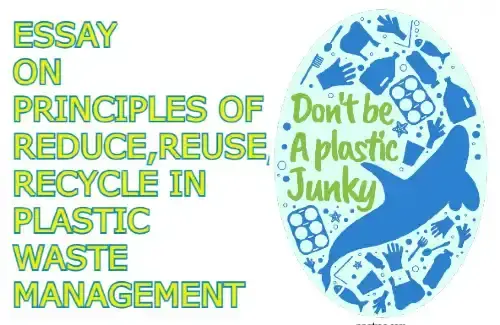Essay on principles of reduce reuse and recycle
You probably learned the 3 bucks of responsible waste management in school. These are the three essential components of environmentally responsible consumer behaviour - reduce, reuse and recycle. 3 RS aims to educate people about preventing excessive and unnecessary waste and limiting the consumption of non-renewable resources.
If you have a young child in your home, or just find yourself in need of a refresher, here's a reminder of how you can change some simple daily habits to keep waste out of landfills.
Discount:
Reduce the number of ingredients and goods you consume. This may mean limiting the number of purchases you make in the first place. Do you really need another bottle of nail polish or another pair of black shoes?
To determine your actual needs and avoid impulsive purchases, try the three-day rule: If you want to buy something non-essential, wait three days. If you're still thinking about it after three days, you can buy it. Most likely, you must have forgotten about it.
There are other ways to reduce your consumption without limiting purchases. Buying foods in bulk often means less packaging waste. Buying in bulk is useful if you're sure you'll need the full quantity you're buying. Otherwise, it may be worthless if you can't use up all the stuff before it expires.
Budgeting can also help you reduce resource consumption. If you're thinking about a new computer, but your old computer works well, save your money little by little until you buy a new computer without using a credit card or payment plan. Can. By the time you've gotten the money you saved, you may actually need a new computer, or you may have realized that your saved money is a better use.
Turning off the lights when you're not in the room, unplugging electronics when not in use, and fixing drippy faucets are other ways to reduce your consumption of essential resources. It will also reduce your utility bills - bonus!
Reuse:
Reusing is the act of taking old items that you might consider throwing away and finding a new use for them.
Get the most out of the materials you encounter. The jars of grocery store foods can be used to store leftovers or make lunch at work. Use old clothes as cleaning rags.
Sometimes the material can be reused by other people. Working computers and parts can often be donated to community centres or charitable organizations. Clothes can often be donated and given a second life.
Recycle:
This is probably the most famous and well thought out Rs. If you have recycling pickup services, you will be familiar with recycled paper, plastic and metal materials. These materials are carefully processed in TC Recycling. The separated and processed material will later be processed into other goods.
Another way to participate in this Rs 3 buck is by buying recycled stuff. You may start to notice more and more products with a "Made from Recycled Materials" stamp. These products are no different from standard items; They are only helping to make the most of valuable resources.
Essay on principles of reduce reuse and recycle
Think about these three ways:-
-Reduce the number of the Earth's resources that we use.
- Reuse Don't just bin it, could someone else make use of it?
- Recycle Can the materials be made into something new?
HOW YOU CAN HELP?
- By learning about and PRACTICING the three R's of waste management: Reduce, reuse and recycle!
- Practising all three of these activities every day is important for a healthy environment.
- Decisions in making our world a safe and healthy place.
- Reduce: to make something smaller or useless, resulting in a smaller amount of waste.
- "Source reduction" is reducing waste before you purchase it, or by purchasing products that are not wasteful in their packaging or use.
- A key part of waste "reduction" is "conservation" - using natural resources wisely, and using less than usual in order avoid waste.
- You can reduce the amount of waste you create by choosing what rubbish you throw away. This can be easy and fun - just follow the simple guidelines to reduce your waste at home, school or work.
Also read: Elimination of Single Use Plastic Essay
Also read: A Future without Plastic Waste through Sustainability and Circularity Essay
Also read: Essay On Mainstreaming alternatives to Single Use Plastic Products through Innovation and Creativity
Also read: Essay On Strategy Of 6r's- Reduce, Reuse, Recycle, Recover, Redesign, Remanufacture
Also read: Essay On Innovative Ideas for Zero Plastic Waste
Also read: Essay on harmful effects of plastic bags
THANK YOU SO MUCH

You've created an excellent blog about Electronic Recycling Services. Your blog gave me some unique and useful information. Thank you for bringing this article to our attention.
ReplyDeleteThank you for providing me with such valuable information. This article provided me with some useful knowledge. Continue to make posts like this. Recycling consultants
ReplyDeleteThe collaborative nature of Heardle fosters a sense of camaraderie among players
ReplyDelete